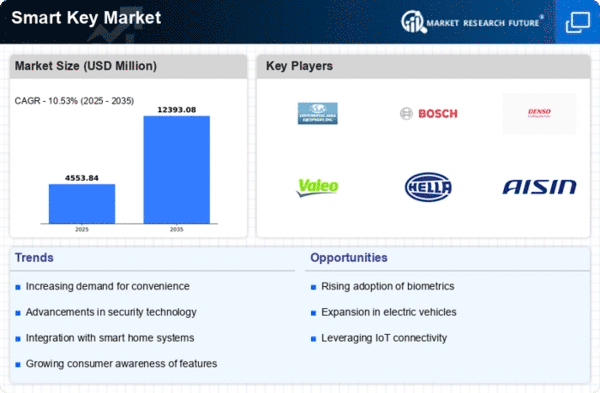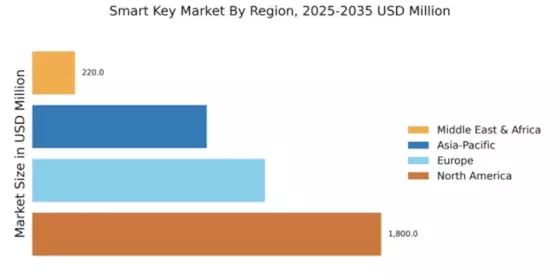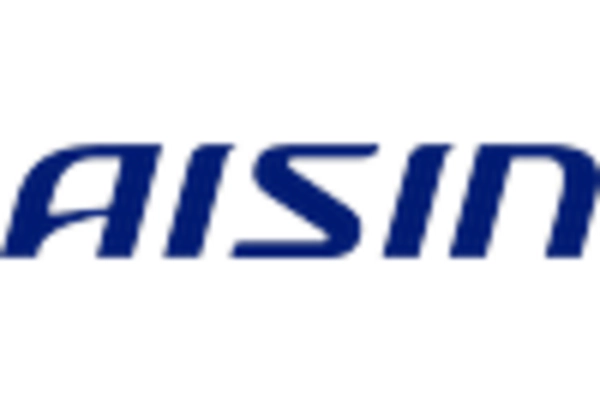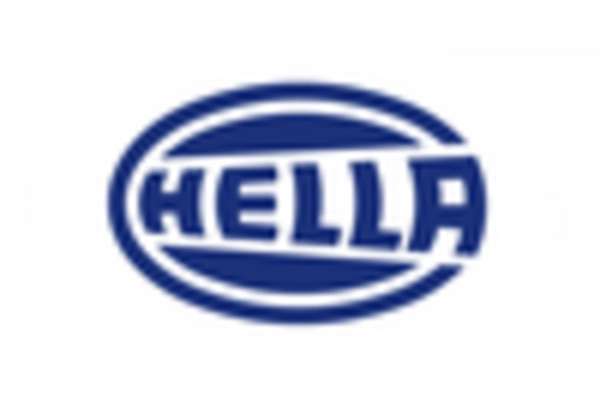Market Growth Projections
The Global Smart Key Market Industry is characterized by robust growth projections, reflecting the increasing integration of smart key technology in various sectors. The market is expected to reach a value of 4.12 USD Billion in 2024, with a remarkable growth trajectory anticipated through 2035, when it could potentially reach 12.4 USD Billion. This growth is underpinned by a compound annual growth rate (CAGR) of 10.54% from 2025 to 2035, indicating a sustained demand for smart key solutions across automotive and other industries. The upward trend in market value suggests a strong alignment with technological advancements and consumer preferences.
Increasing Adoption of Electric Vehicles
The Global Smart Key Market Industry is likely to benefit from the increasing adoption of electric vehicles (EVs). As governments worldwide implement policies to promote sustainable transportation, the demand for EVs is rising. Smart keys are becoming integral to these vehicles, offering features such as remote battery monitoring and charging status updates. This integration not only enhances user convenience but also aligns with the eco-friendly ethos of electric mobility. The market's growth is further supported by a projected compound annual growth rate (CAGR) of 10.54% from 2025 to 2035, indicating a strong correlation between the rise of EVs and smart key technology.
Rising Demand for Advanced Security Features
The Global Smart Key Market Industry experiences a notable surge in demand for advanced security features in automotive applications. As consumers increasingly prioritize safety and convenience, manufacturers are integrating smart key technology that offers enhanced security protocols, such as biometric authentication and encrypted communication. This trend is reflected in the projected market value of 4.12 USD Billion in 2024, indicating a robust interest in innovative security solutions. Furthermore, the growing prevalence of vehicle theft and the need for anti-theft measures drive the adoption of smart keys, which are perceived as a reliable deterrent against unauthorized access.
Regulatory Support for Enhanced Vehicle Security
Regulatory support for enhanced vehicle security is a driving force in the Global Smart Key Market Industry. Governments are increasingly recognizing the importance of advanced security measures in vehicles to combat rising theft rates. Legislation promoting the adoption of smart key technology is being implemented, encouraging manufacturers to prioritize security features in their designs. This regulatory landscape not only fosters innovation but also creates a favorable environment for market growth. As a result, the industry is poised for expansion, with projections indicating a market value of 4.12 USD Billion in 2024, driven by compliance with evolving security standards.
Technological Advancements in Automotive Industry
Technological advancements play a pivotal role in shaping the Global Smart Key Market Industry. The integration of Internet of Things (IoT) technology into vehicles facilitates seamless connectivity between smart keys and automobiles. This connectivity allows for features such as remote access, keyless entry, and vehicle tracking, enhancing user experience. As the automotive sector evolves, the market is projected to expand significantly, with an anticipated growth to 12.4 USD Billion by 2035. The continuous innovation in smart key technology, driven by consumer expectations for convenience and efficiency, suggests a promising trajectory for the industry.
Consumer Preference for Convenience and Connectivity
Consumer preference for convenience and connectivity significantly influences the Global Smart Key Market Industry. As lifestyles become increasingly fast-paced, individuals seek solutions that simplify their daily routines. Smart keys provide a seamless experience, allowing users to unlock and start their vehicles without traditional keys. This shift in consumer behavior is evident in the growing sales of vehicles equipped with smart key technology. The market's expansion is underscored by the anticipated growth to 12.4 USD Billion by 2035, reflecting a broader trend towards integrated technology in personal transportation. The convenience offered by smart keys aligns with modern consumer expectations.
















